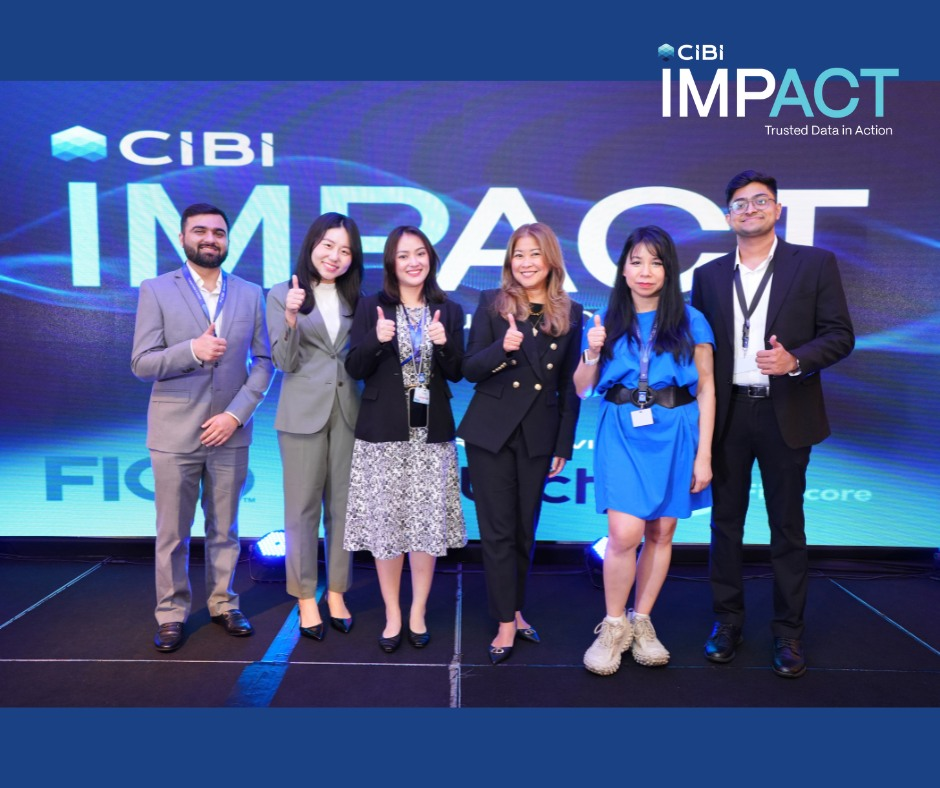The Philippine credit landscape stands at a critical juncture. While consumer demand for financing continues to surge, persistent challenges like limited access, insufficient credit data, and high delinquency rates cast a long shadow. It’s against this backdrop that CIBI Information, Inc., the country’s pioneering local credit bureau, convened its inaugural industry summit, “CIBI Impact 2025: Trusted Data in Action.”
This landmark event gathered over 150 top regulators, senior executives, partners, and decision-makers to confront these realities, charting a decisive path forward where trust, transparency, and collaboration become the bedrock of an inclusive financial future.
The credit landscape: Rising demand, persistent gaps

Nicholas Mapa, Chief Economist at Metrobank, explaining the surge in demand for financing
Insights shared at CIBI Impact 2025 painted a clear picture of Filipinos’ increasing engagement with credit. Nicholas Mapa, Chief Economist at Metrobank, highlighted a significant surge in demand for financing, a sentiment echoed by the credit bureau’s Chief Analytics Officer Harley Chan, who noted a remarkable rise in credit tradelines.
Products like “Buy Now Pay Later” (BNPL) are expanding at an astonishing pace, even outstripping traditional avenues like mortgages and auto financing, fueled by fintech digitization and stronger government initiatives. Credit Information Corporation (CIC) President and CEO Atty. Ben Baltazar further underscored this trend, reporting that over 10 million credit reports had been accessed by mid-2025, with demand projected to grow in tandem with lending activity.
Yet, a palpable “trust gap“ continues to impede progress. JurisTech CEO See Wai Hun emphasized that nearly half of all Filipinos remain unbanked, and a staggering 99% of their loan applications face rejection due to insufficient credit data. High delinquency rates and billions lost annually to fraud further erode confidence, compelling lenders to adopt cautious approaches and inadvertently limiting consumers’ access to vital financing.
Fragmented records, misinformation, and inconsistent reporting undermine the credibility essential for robust financial transactions, leading to slower decision-making and untapped opportunities for responsible credit growth.
CIBI Impact 2025: Data-driven insights in action

Photo shows Shubhranshu Kathuria (2nd from left), Vice President of Creador together with CIBI executives Paulo Ribeiro, Head of Sales Planning and Development; Harley Chan, Chief of Analytics; Ariana Sandico, Head of Strategy and Innovation; Ivy Ramirez, Vice President for Service and Industrials; Pia L. Arellano, President and CEO; Miguel Isip, Chief Financial and Corporate Services Officer; Gabby Lopez, Head of Business Development and Delivery; and Walter Guilarte, Head of Culture, Learning, and Engagement.
Held at the Makati Shangri-La to coincide with the company’s 43rd anniversary, CIBI Impact 2025 carried the powerful theme: “Data-Driven Insights for Quicker, Smarter Decisions.”
Pia Arellano, President and CEO of CIBI, set the tone by stating, “Today, I stand before you with deep gratitude and a renewed purpose as we celebrate the 43-year legacy of CIBI… While we honor our history, we are equally focused on the future. We aim to preserve and nurture the legacy built over decades while continuing to evolve, transform, and innovate.”
“Our goal is to deliver the best identity and data solutions that enable more empowered decision-making, and to be catalysts for financial growth and opportunity across all sectors of society,” she added.

Pia Arellano, President and CEO of CIBI, while delivering her speech at the event
Her remarks underscored the company’s commitment to being a key enabler of sustainable growth for the Philippines.
Keynote speakers including Peter B. Favila, Former Monetary Board Member and Trade Secretary; Nicholas Mapa; and Atty. Ben Baltazar emphasized the growing, indispensable role of trusted data in the country’s financial and regulatory systems.
The summit featured engaging keynote addresses, a fireside chat on the future of inclusive finance, and a series of panel discussions and solution showcases covering CIBI’s Individual Credit, Business Credit, and Workforce Solutions.
Catalysts for change: Trusted data and cross-sector collaboration

CIBI’s Arellano (4th from left) together with the other speakers at the event
Breaking the cycle of exclusion requires more than just raw data; it demands trusted data. CIBI Vice President for Service & Industrials Ivy Ramirez highlighted that quality data empowers companies to make decisions 30% faster, boost efficiency by 25%, and increase profitability by 19%.
This transparency also strengthens relationships, mitigates risk, and can shorten the time to revenue by an impressive 63%. Conversely, misleading or fragmented data compromises confidence, leading to poor lending decisions and failed partnerships. Trusted data, therefore, isn’t just an operational tool — it is the indispensable foundation of financial inclusion.
Equally vital is cross-sector collaboration. No single entity can effectively tackle systemic barriers alone. Progress necessitates shared accountability, policy alignment, and innovative solutions that genuinely meet evolving consumer needs.
This collaborative ethos was prominently displayed at the event, bringing together regulators, financial institutions, and fintechs. Partners such as FICO, JurisTech, and FinScore showcased how ecosystem-led strategies can collectively strengthen trust, expand credit visibility, and extend services to more Filipinos, proving that true inclusion is achievable through coordinated action. Deeper discussions also featured the pioneering local credit bureau’s Advanced Tier platform and the emerging Fraud Bureau, offering forward-looking perspectives on adapting to market and regulatory demands.
Looking ahead: A connected and inclusive financial future
Arellano concluded the summit by reaffirming the bureau’s role as a catalyst for inclusion. She emphasized that while credit demand is rapidly rising, the trust gap remains the most significant hurdle to inclusive access.
She eloquently articulated the credit bureau’s broader impact: “Financial access for millions of Filipinos. Whether it’s a student applying for their first loan, an entrepreneur trying to scale a business, or a family investing in their future, our work empowers those moments. Because when people are seen, verified, and trusted, they are empowered to act.”
“As the world grows more digital and more connected, the need for reliable, responsible, and real-time data becomes greater than ever… Our mission is to innovate and collaborate so that trust in data keeps pace with demand — because only then can we build a future where no Filipino is left behind,” she further stated.
By firmly anchoring progress on trusted data and robust collaboration, the industry can effectively transform rising demand into meaningful access, thereby unlocking a more inclusive, secure, and prosperous financial future for the Philippines.








